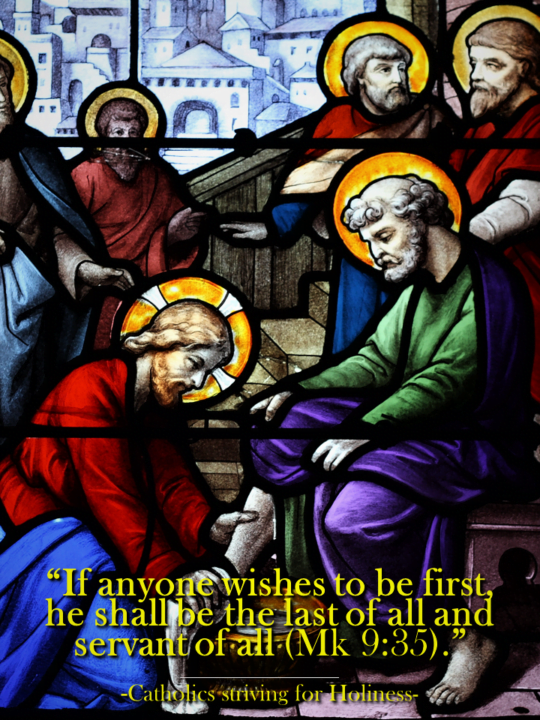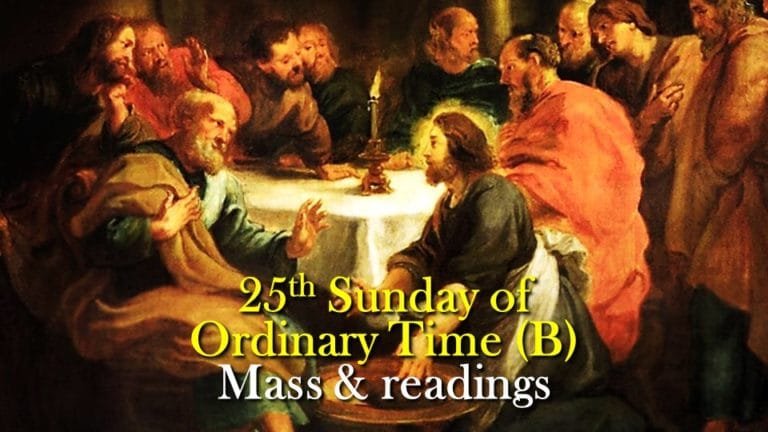POPE FRANCIS ON THE 25TH SUNDAY IN ORDINARY TIME YEAR B
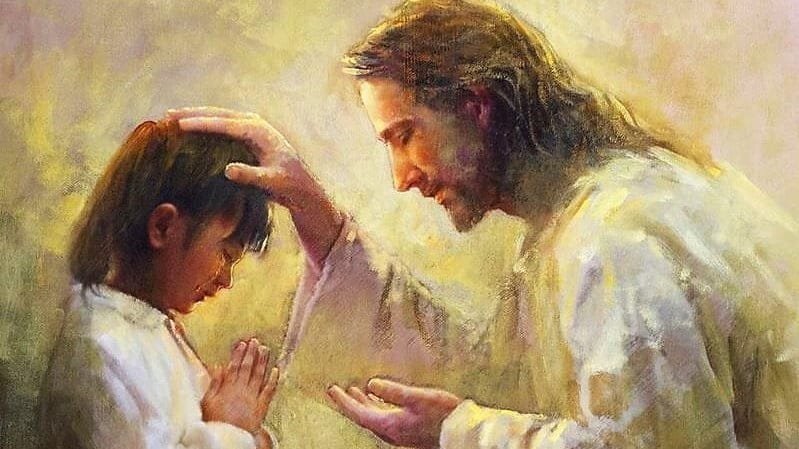
ANGELUS
Saint Peter’s Square
Sunday, 22 September 2024
___________________________________
Dear brothers and sisters, happy Sunday!
Today the Gospel of the liturgy (Mk 9:30-37) tells us about Jesus who announces what will happen at the culmination of His life: “The Son of man”, says Jesus, “will be delivered into the hands of men, and they will kill Him; and when He is killed, after three days He will rise” (v. 31). The disciples, however, while they are following the Master, have other things in their mind and also on their lips. When Jesus asks them what they were talking about, they do not answer.
Let us pay attention to this silence: the disciples are silent because they were discussing who was the greatest (cf. v. 34). They fall silent out of shame. What a contrast with the words of the Lord! While Jesus confided in them the meaning of His very life, they were talking about power. And so now shame closes their mouth, just as pride had closed their heart earlier. And yet Jesus responds openly to the conversations whispered along the way: “If any one would be first, he must be last of all and servant of all” (cf. v. 35). Do you want to be great? Make yourself small, put yourself at the service of all.
With a word as simple as it is decisive, Jesus renews our way of living. He teaches us that true power does not lie in the dominion of the strongest, but in care for the weakest. True power is taking care of the weakest – this makes you great!
This is why the Master calls a child, puts him in the midst of the disciples and embraces him, saying: “Whoever receives one such child in my name receives me” (v. 37). The child has no power; the child has needs. When we take care of man, we recognize that man is always in need of life.
We, all of us, are alive because we have been welcomed, but power makes us forget this truth. You are alive because you have been welcomed! Then, we become dominators, not servants, and the first to suffer as a result are the last: the little ones, the weak, the poor.
Brothers and sisters, how many people, how many, suffer and die for power struggles! Theirs are lives that the world denies, as it denied Jesus, those who are excluded and die… When He is delivered into the hands of men, He finds not an embrace, but a cross. However, the Gospel remains living and filled with hope: He who has denied, is risen, He is the Lord!
Now, on this beautiful Sunday, we can ask ourselves: do I know how to recognize the face of Jesus in the smallest? Do I take care of my neighbour, serving generously? And do I thank those who take care of me?
Let us pray together to Mary, to be, like her, free of vainglory, and ready in service.
Source: https://www.vatican.va/content/francesco/en/angelus/2024/documents/20240922-angelus.html
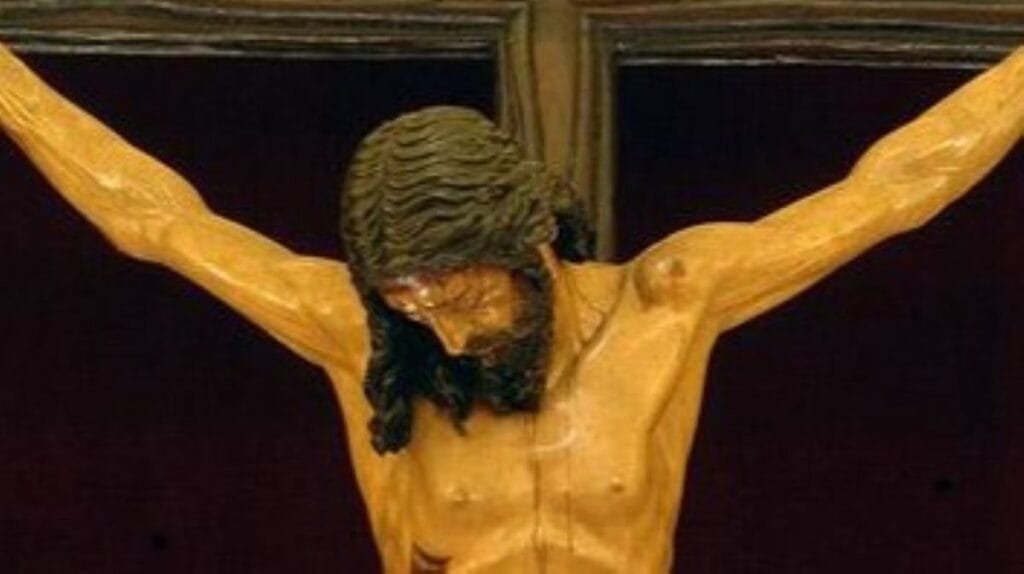
HOLY MASS
HOMILY OF HIS HOLINESS POPE FRANCIS
Plaza de la Revolución, Havana
25th Sunday in Ordinary Time year B, 20 September 2015
Jesus asks his disciples an apparently indiscreet question: “What were you discussing along the way?” It is a question which he could also ask each of us today: “What do you talk about every day?” “What are your aspirations?” The Gospel tells us that the disciples “did not answer because on the way they had been arguing about who was the most important”. They were ashamed to tell Jesus what they were talking about. Like the disciples then, today we too can be caught up in these same arguments: who is the most important?
Jesus does not press the question. He does not force them to tell him what they were talking about on the way. But the question lingers, not only in the minds of the disciples, but also in their hearts.
Who is the most important? This is a life-long question to which, at different times, we must give an answer. We cannot escape the question; it is written on our hearts. I remember more than once, at family gatherings, children being asked: “Who do you love more, Mommy or Daddy”? It’s like asking them: “Who is the most important for you?” But is this only a game we play with children? The history of humanity has been marked by the answer we give to this question.
Jesus is not afraid of people’s questions; he is not afraid of our humanity or the different things we are looking for. On the contrary, he knows the depths of the human heart, and, as a good teacher, he is always ready to encourage and support us. As usual, he takes up our searching, our aspirations, and he gives them a new horizon. As usual, he somehow finds an the answer which can pose a new challenge, setting aside the “right answers”, the standard replies we are expected to give. As usual, Jesus sets before us the “logic” of love. A mindset, an approach to life, which is capable of being lived out by all, because it is meant for all.
Far from any kind of elitism, the horizon to which Jesus points us is not for those few privileged souls capable of attaining the heights of knowledge or different levels of spirituality. The horizon to which Jesus points us always has to do with daily life, also here on “our island”, something which can season our daily lives with eternity.
Who is the most important? Jesus is straightforward in his reply: “Whoever wishes to be the first – the most important – among you must be the last of all, and the servant of all”. Whatever wishes to be great must serve others, not be served by others.
This is the great paradox of Jesus. The disciples were arguing about who would have the highest place, who would be chosen for privileges – they were the disciples, those closest to Jesus, and they were arguing about that! –, who would be above the common law, the general norm, in order to stand out in the quest for superiority over others. Who would climb the ladder most quickly to take the jobs which carry certain benefits.
Jesus upsets their “logic”, their mindset, simply by telling them that life is lived authentically in a concrete commitment to our neighbor. That is, by serving.
The call to serve involves something special, to which we must be attentive. Serving means caring for their vulnerability. Caring for the vulnerable of our families, our society, our people. Theirs are the suffering, fragile and downcast faces which Jesus tells us specifically to look at and which he asks us to love. With a love which takes shape in our actions and decisions. With a love which finds expression in whatever tasks we, as citizens, are called to perform. It is people of flesh and blood, people with individual lives and stories, and with all their frailty, that Jesus asks us to protect, to care for and to serve. Being a Christian entails promoting the dignity of our brothers and sisters, fighting for it, living for it. That is why Christians are constantly called to set aside their own wishes and desires, their pursuit of power, before the concrete gaze of those who are most vulnerable.
There is a kind of “service” which serves others, yet we need to be careful not to be tempted by another kind of service, one which is “self-serving” with regard to others. There is a way to go about serving which is interested in only helping “my people”, “our people”. This service always leaves “your people” outside, and gives rise to a process of exclusion.
All of us are called by virtue of our Christian vocation to that service which truly serves, and to help one another not to be tempted by a “service” which is really “self-serving”. All of us are asked, indeed urged, by Jesus to care for one another out of love. Without looking to one side or the other to see what our neighbor is doing or not doing. Jesus says: “Whoever would be first among you must be the last, and the servant of all”. That person will be the first. Jesus does not say: if your neighbor wants to be first, let him be the servant! We have to be careful to avoid judgmental looks and renew our belief in the transforming look to which Jesus invites us.
This caring for others out of love is not about being servile. Rather, it means putting the question of our brothers and sisters at the center. Service always looks to their faces, touches their flesh, senses their closeness and even, in some cases, “suffers” that closeness and tries to help them. Service is never ideological, for we do not serve ideas, we serve people.
God’s holy and faithful people in Cuba is a people with a taste for celebrations, for friendship, for beautiful things. It is a people which marches with songs of praise. It is a people which has its wounds, like every other people, yet knows how to stand up with open arms, to keep walking in hope, because it has a vocation of grandeur. These were the seeds sown by your forebears. Today I ask you to care for this vocation of yours, to care for these gifts which God has given you, but above all I invite you to care for and be at the service of the frailty of your brothers and sisters. Do not neglect them for plans which can be seductive, but are unconcerned about the face of the person beside you. We know, we are witnesses of the incomparable power of the resurrection, which “everywhere calls forth the seeds of a new world” (cf. Evangelii Gaudium, 276, 278).
Let us not forget the Good News we have heard today: the importance of a people, a nation, and the importance of individuals, which is always based on how they seek to serve their vulnerable brothers and sisters. Here we encounter one of the fruits of a true humanity.
Because, dear brothers and sisters: “whoever does not live to serve, does not ‘serve’ to live”.
Source: https://www.vatican.va/content/francesco/en/homilies/2015/documents/papa-francesco_20150920_cuba-omelia-la-habana.html
EMPHASIS MINE
Copyright © Dicastero per la Comunicazione – Libreria Editrice Vaticana
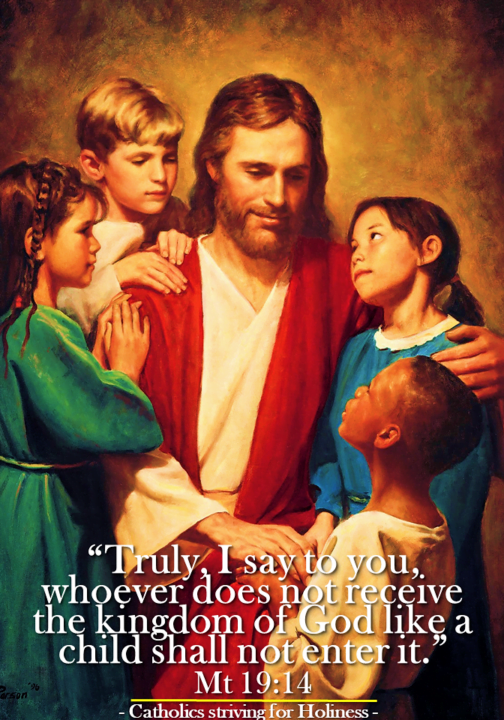
ANGELUS
Saint Peter’s Square
25th Sunday in Ordinary Time Year B, 19 September 2021
____________________________
Dear brothers and sisters, buongiorno!
The Gospel of today’s Liturgy (Mk 9:30-37) narrates that, on the way to Jerusalem, Jesus’ disciples were discussing “with one another who was the greatest” (v. 34). So, Jesus directed harsh words toward them that are still valid today: “If any one would be first, he must be last of all and servant of all” (v. 35). If you want to be first, you need to get in line, be last, and serve everyone. Through this shocking phrase, the Lord inaugurates a reversal: he overturns the criteria about what truly matters. The value of a person does not depend any more on the role they have, the work they do, the money they have in the bank. No, no, no, it does not depend on this. Greatness and success in God’s eyes are measured differently: they are measured by service. Not on what someone has, but on what someone gives. Do you want to be first? Serve. This is the way.
Today, the word “service” appears a bit hackneyed, worn out by use. But it has a precise and concrete meaning in the Gospel. To serve is not a courteous expression: it means to act like Jesus, who, summing up his life in a few words, said he had come “not to be served, but to serve” (Mk 10:45). This is what the Lord said. Therefore, if we want to follow Jesus, we must follow the path he himself traced out, the path of service. Our fidelity to the Lord depends on our willingness to serve. And we know this often costs, because “it tastes like a cross”. But, as our care and availability toward others grows, we become freer inside, more like Jesus. The more we serve, the more we are aware of God’s presence. Above all, when we serve those who cannot give anything in return, the poor, embracing their difficulties and needs with tender compassion: and we in turn discover God’s love and embrace there.
After having spoken of the primacy of service, Jesus does something precisely to illustrate this. We have seen that Jesus’ actions are stronger than the words he uses. And what is that action? He takes a child and puts him in the midst of the disciples, at the center, in the most important place (cf. v. 36). In the Gospel, the child does not symbolize innocence so much as littleness. For like children, the little ones depend on others, on adults, they need to receive. Jesus embraces those children and says that those who welcome a little one, a child, welcome him (cf. v. 37). The ones who are to be served above all are: those in need of receiving who cannot give anything in return. To serve those who need to receive and cannot give anything in return. In welcoming those on the margins, the neglected, we welcome Jesus because He is there. And in the little one, in the poor person we serve, we also receive God’s tender embrace.
Dear brothers and sisters, challenged by the Gospel, let us ask ourselves: Am I, who follow Jesus, interested in the one who is neglected? Or am I rather seeking personal gratification, like the disciples that day? Do I understand life in terms of competing to make room for myself at others’ expense, or do I believe that being first means serving? And, concretely: do I dedicate time to a “little one”, to a person who has no means to pay me back? Am I concerned about someone who cannot give me anything in return, or only with my relatives and friends? These are the questions we need to ask ourselves.
May the Virgin Mary, the humble servant of the Lord, help us understand that to serve does not belittle us, but helps us grow. And that there is more joy in giving than in receiving (cf. Acts 20:35).
________________________________________
SOURCE: https://www.vatican.va/content/francesco/en/angelus/2021/documents/papa-francesco_angelus_20210919.html
EMPHASIS MINE.
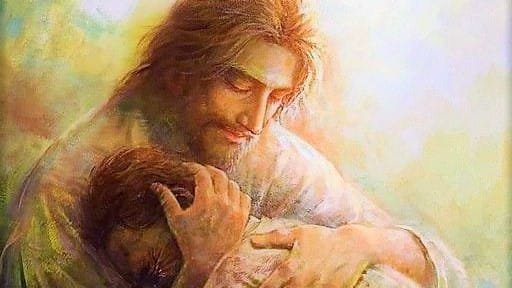
HOMILY OF HIS HOLINESS
Santakos Park in Kaunas (Lithuania)
25th Sunday in Ordinary Time year B, 23 September 2018
Saint Mark devotes an entire section of his Gospel to the instruction of the Lord’s disciples. It would seem that Jesus, at the halfway point of his journey to Jerusalem, wanted them to renew their choice to follow him, knowing that it would entail moments of trial and grief. The Evangelist describes this period of Jesus’ life by mentioning that on three occasions he announced his passion. All three times, the disciples expressed bewilderment and opposition, and on each of these occasions the Lord wished to leave them a teaching. We have just heard about the second of these three occasions (cf. Mk 9:30-37).
The Christian life always involves experiences of the cross; at times they can seem interminable. Earlier generations still bear the scars of the period of the occupation, anguish at those who were deported, uncertainty about those who never returned, shame for those who were informers and traitors. The Book of Wisdom speaks to us of the just who are persecuted, who suffer insult and punishment solely for their goodness (cf. Wis 2:10-12). How many of you can identify at first hand, or in the history of some family member, with that passage which we just read? How many of you have also felt your faith shaken because God did not appear to take your side? Because the fact of your remaining faithful was not enough for him to intervene in your history? Kaunas knows about this; Lithuania as a whole can testify to it, still shuddering at the mention of Siberia, or the ghettos of Vilnius and Kaunas, among others. You can repeat the words of condemnation uttered by the apostle James in the passage of his Letter that we heard: they covet, they murder, they engage in disputes and conflicts (cf. 4:2).
The disciples did not want Jesus to speak to them of sorrows and the cross; they wanted nothing to do with trials and hardships. Saint Mark tells us that they were interested in other things, that on the way home they discussed who was the greatest among them. Brothers and sisters: the thirst for power and glory is the sign of those who fail to heal the memories of the past and, perhaps for that very reason, to take an active part in the tasks of the present. They would rather discuss who was better, who acted with greater integrity in the past, who has more right to privileges than others. In this way, we deny our own history, “which is glorious precisely because it is a history of sacrifice, of hopes and daily struggles, of lives spent in service and fidelity to work, tiring as it may be” (Evangelii Gaudium, 96). It is a fruitless and vain attitude that refuses to get involved in building the present, since it has lost contact with the struggles of our faithful people. We cannot be like those spiritual “sages” who only judge from afar and chatter constantly about “what ought to be done” (cf. ibid.).
Jesus, knowing what the disciples were discussing, provided them with an antidote to their struggles for power and their rejection of sacrifice. And to make his teaching all the more solemn, he sat down, as a teacher would, summoned them and set a child in their midst; the kind of child that would earn a penny for doing chores no one else would care to do. Whom would Jesus place in our midst today, here, on this Sunday morning? Who will be the smallest, the poorest in our midst, whom we should welcome a hundred years after our independence? Who is it that has nothing to give us, to make our effort and our sacrifices worthwhile? Perhaps it is the ethnic minorities of our city. Or the jobless who have to emigrate. May be it is the elderly and the lonely, or those young people who find no meaning in life because they have lost their roots.
“In their midst” means at the same distance from everybody, so that no one can claim not to notice, no one can argue that it is “somebody else’s responsibility” because “I didn’t see him”, or “I am further away”. And without anyone drawing attention to oneself, wanting to be applauded or singled out for praise.
There, in the city of Vilnius, the river Vilnia brought its waters and lost its name to the Neris; here, the Neris itself loses its name bringing its waters to the Neman. This reminds us of what it means to be a Church on the move, unafraid to go out and get involved, even when it might seem that we pour ourselves out, lose ourselves, in going forth to the weak, the neglected, those dwelling at the margins of life. Yet also knowing that to go forth also means to halt at times, to set aside our worries and cares, and to notice, to listen to and to accompany those left on the roadside. At times, it will mean acting like the father of the prodigal son, who waited at the door for his return, to fling it open as soon as he arrived (cf. ibid, 46). At other times, like the disciples, we will need to learn that in welcoming a little child, we welcome Jesus himself.
That is why we are here today. We want to welcome Jesus, in his word, in the Eucharist, in his little ones. To welcome him so that he can heal our memory and accompany us in this present time that presents us with exciting challenges and signposts, so that we can follow him as his disciples. For there is nothing truly human that does not find an echo in the heart of Christ’s disciples. We feel as our own the joys and the hopes, the sorrows and the afflictions of the people of our time, particularly the poor and the suffering (cf. SECOND VATICAN ECUMENICAL COUNCIL, Gaudium et Spes, 1). For this reason, and because as a community we feel true and profound solidarity with all humanity – here in this city and throughout Lithuania – and its history (cf. ibid.), we wish to spend our lives in joyful service, and thus to make known to all that Jesus Christ is our one hope.
Source: https://www.vatican.va/content/francesco/en/homilies/2018/documents/papa-francesco_20180923_omelia-lituania-kaunas.html
EMPHASIS MINE
Copyright © Dicastero per la Comunicazione – Libreria Editrice Vaticana
Stay updated: subscribe by email for free TO OUR NEW WEBSITE www.catholicsstrivingforholiness.org (PUT YOUR EMAIL IN THE SUBSCRIBE WIDGET).
We are also in www.fb.com/Catholicsstrivingforholiness. Kindly help more people in their Christian life by liking our page and inviting your family, friends and relatives to do so as well. Thanks in advance and God bless you and your loved ones! Fr. Rolly Arjonillo
